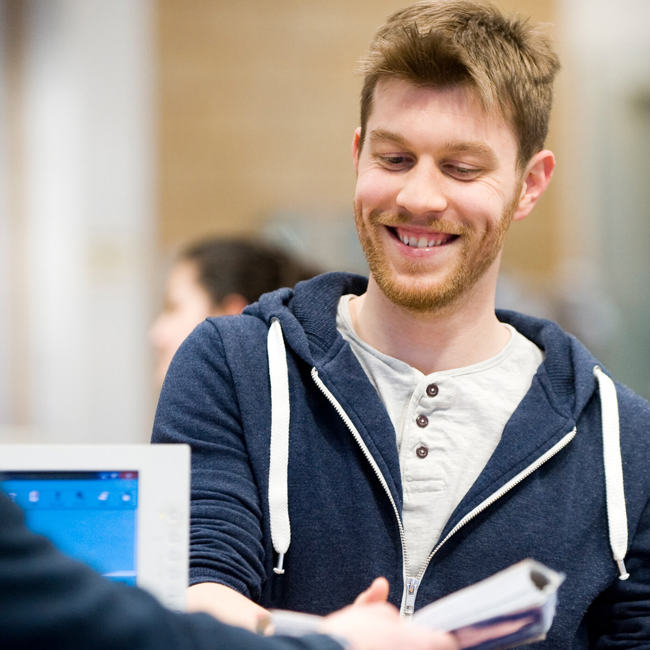
Disability Support
Every student should be able to experience the full range of the university’s activities. If you have a disability, a long-standing medical condition or a specific learning difficulty such as dyslexia, the Disability Service can help you make the most of your time at UWS.
To arrange a meeting with an adviser please complete a Student Support Request Form and return to disabilityservice@uws.ac.uk
Personalised support
Our advisers can work with you to develop the right support for lectures, individual study and assessments. Support is flexible: it can be adapted to the changing demands of your course.
We can:
- liaise with academic staff about any reasonable adjustments you need
- recommend exam support, such as extra time or use of a PC
- make a referral to the university’s occupational therapist
- make arrangements in other areas, such as library support or blue badge parking
- access funding for equipment or support.
Specific learning difficulties
Specific learning difficulties include conditions such as dyslexia, dyscalculia and dyspraxia.
UWS is an inclusive and modern university. All students can make use of facilities such as:
- lecture capture (where lectures are recorded, usually the slideshow plus audio)
- lecture materials provided in advance on Moodle
- assistive software on all campus PCs, with packages for mind-mapping, read-aloud and enhanced spelling and grammar checking
- skills development advisers to help improve your study skills.
Most students with a specific learning difficulty will find these resources meet their needs. But if you feel you need extra support, please contact us by completing a request form.
Neurodiversity
The term 'neurodiversity' describes the variation in the way our minds work. Neurodivergence is commonly associated with a series of conditions, including, but not limited to:
Dyslexia
a condition which causes difficulties in reading or interpreting words, letters, and other symbols.
Dyspraxia
a condition which affects physical coordination.
Attention Deficit Hyperactivity Disorder (ADHD)
a condition which affects ability to control attention and concentration.
Autism Spectrum Disorder (ASD)
a condition that affects communication, social interaction, and behaviour.
Tourette’s Syndrome
a condition that means you may make sounds or movements that you can’t control.
Dyscalculia
a condition that affects the ability to acquire arithmetical skills.
To arrange a meeting with an Adviser to discuss support available, please contact us by completing a Support Request Form and return to disabilityservice@uws.ac.uk
Study resources and assistive technology
The University has a range of software tools available that you can utilise to study effectively and develop the skills you need to succeed.
TextAid
UWS Students get free access to TextAid tools to help with reading, spelling, comprehension, working memory and concentration.
- Listen to any text
- Use on any device
- Proofread your work
- Annotate text
- Translate text
- Word prediction
- Spell checker
Inspiration
UWS students also get free access to Inspiration which is visual thinking software. Visual thinking is a learning style where the learner better understands and retains information when ideas, words and concepts are associated with images.
Find out more about key academic skills resources available on the Academic Skills Webpage.
SilverCloud
SilverCloud gives you secure, immediate access to interactive CBT (cognitive behavioural therapy) modules.
Programmes include:
- Space from Stress
- Self Management Toolkit
- Space for Resilience
- Space for Positive Body Image
It’s easy to use, interesting and motivational. Access it anywhere on your computer, tablet or mobile. Learn more and sign up online.
Online accessibility
Many websites provide help on how to get the most of the accessibility features and assistive technologies available for your computer. Here are a few we would recommend.
Campuses and facilities
We aim to make our campus inclusive and welcoming to all and offer a range of facilities and services to support disabled staff, students and visitors including:
- Mobility friendly buildings – we have ramps, automatic doors and wide hallways across campus buildings to facilitate wheelchair access
- Accessible restrooms and parking – we have designated accessible restrooms on campus and parking spaces near all main facilities
- Clear signage and maps – clearer signage with larger print is now in place on all of our campuses to facilitate easier movement
- Quiet rooms and rest areas – we have established quiet rooms and sanctuary spaces on campus
- Evacuation chairs and accessible furniture for classrooms
- Dedicated shower and wet room facilities
- Staff training – we train our staff in best practice to ensure our service provision is inclusive
- Feedback mechanisms – we enable student residents to provide feedback on accessibility issues and have simple and easy-to-follow processes for requesting new accommodation or adaptations
- SafeZone – we have a digital app to connect with our support services which is free to download.


